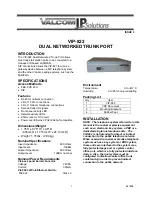
20
Cisco 3900 Series, Cisco 2900 Series, and Cisco 1900 Series Integrated Services Routers Generation 2 Software Configuration Guide
Chapter Basic Router Configuration
Configuring a Loopback Interface
DETAILED STEPS
Example
The loopback interface in this sample configuration is used to support Network Address Translation
(NAT) on the virtual-template interface. This configuration example shows the loopback interface
configured on the gigabit ethernet interface with an IP address of 200.200.100.1/24, which acts as a static
IP address. The loopback interface points back to virtual-template1, which has a negotiated IP address.
!
interface loopback 0
ip address 200.200.100.1 255.255.255.0 (
static IP address
)
ip nat outside
!
interface Virtual-Template1
ip unnumbered loopback0
no ip directed-broadcast
ip nat outside
!
Verifying Configuration
To verify that you have properly configured the loopback interface, enter the
show interface loopback
command. You should see verification output similar to the following example.
Router#
show interface loopback 0
Loopback0 is up, line protocol is up
Hardware is Loopback
Internet address is 200.200.100.1/24
MTU 1514 bytes, BW 8000000 Kbit, DLY 5000 usec,
reliability 255/255, txload 1/255, rxload 1/255
Encapsulation LOOPBACK, loopback not set
Last input never, output never, output hang never
Last clearing of "show interface" counters never
Queueing strategy: fifo
Output queue 0/0, 0 drops; input queue 0/75, 0 drops
Command
Purpose
Step 1
interface
type number
Example:
Router(config)# interface Loopback 0
Router(config-if)#
Enters configuration mode for the loopback
interface.
Step 2
ip address
ip-address mask
Example:
Router(config-if)# ip address 10.108.1.1
255.255.255.0
Router(config-if)#
Sets the IP address and subnet mask for the
loopback interface.
Step 3
exit
Example:
Router(config-if)# exit
Router(config)#
Exits configuration mode for the loopback
interface and returns to global configuration
mode.
















































